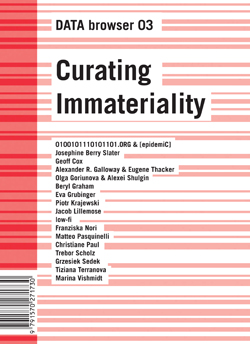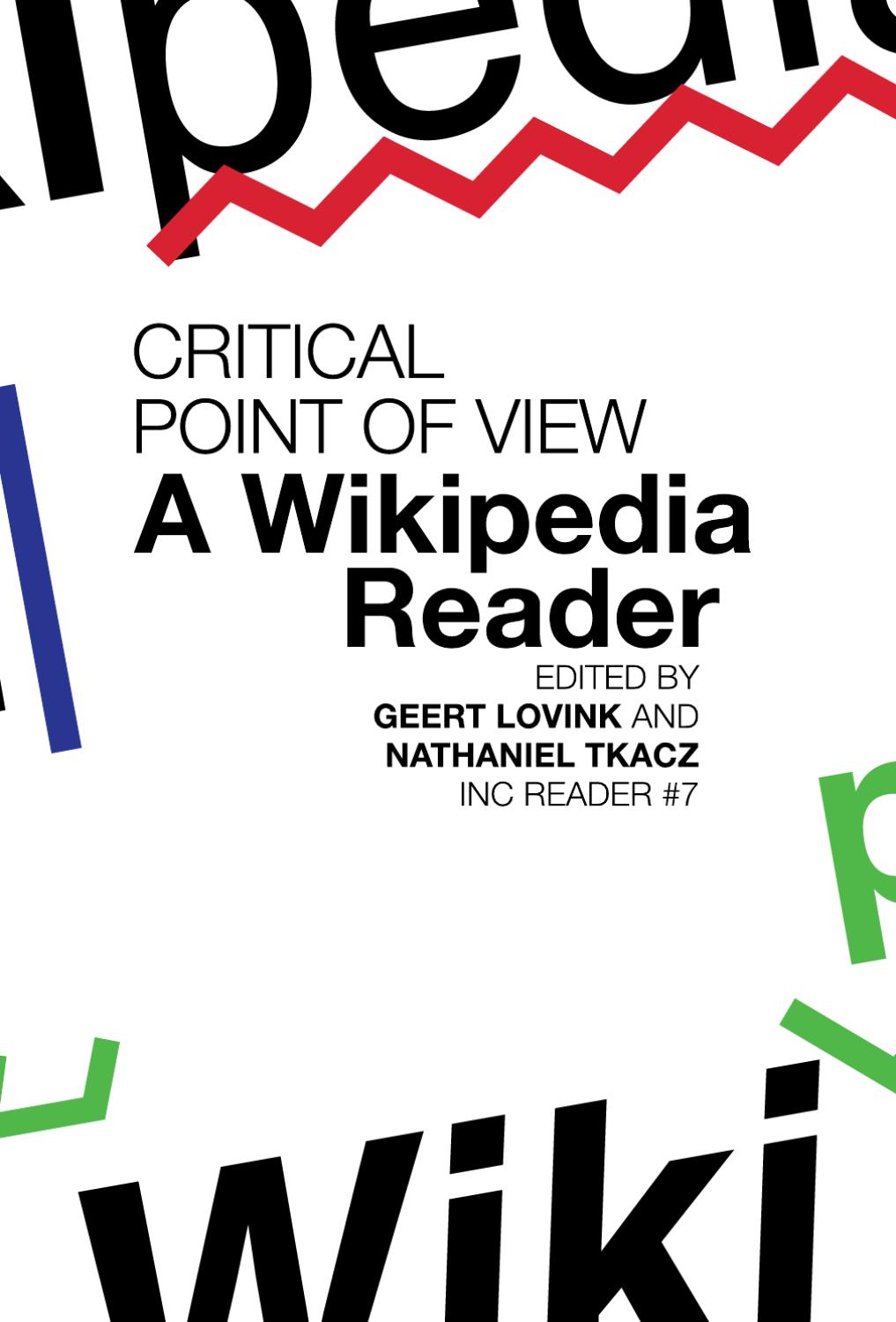Joasia Krysa (ed.): Curating Immateriality: The Work of the Curator in the Age of Network Systems (2006)
Filed under book | Tags: · aesthetics, art, collaboration, curating, database, exhibition, internet, internet art, labour, media art, museum, net art, open source, relational aesthetics, software art, technology

“The site of curatorial production has been expanded to include the space of the Internet and the focus of curatorial attention has been extended from the object to processes to dynamic network systems. As a result, curatorial work has become more widely distributed between multiple agents, including technological networks and software. This upgraded ‘operating system’ of art presents new possibilities of online curating that is collective and distributed — even to the extreme of a self-organising system that curates itself. The curator is part of this entire system but not central to it.
The subtitle of the book makes reference to the essay ‘The Work of Culture in the Age of Cybernetic Systems’ (1988), in which Bill Nichols considered how cybernetics transformed cultural production. He emphasised the shift from mechanical reproduction (symbolised by the camera) to that of cybernetic systems (symbolised by the computer) in relation to the political economy, and pointed to contradictory tendencies inherent in these systems: ‘the negative, currently dominant, tendency toward control, and the positive, more latent potential toward collectivity’. The book continues this general line of inquiry in relation to curating, and extends it by considering how power relations and control are expressed in the context of network systems and immateriality.
In relation to network systems, the emphasis remains on the democratic potential of technological change but also the emergence of what appears as more intensive forms of control. Can the same be said of curating in the context of distributed forms? If so, what does this imply for software curating beyond the rhetoric of free software and open systems?”
Contributors: 0100101110101101.ORG & [epidemiC] | Josephine Berry Slater | Geoff Cox | Alexander R. Galloway & Eugene Thacker | Olga Goriunova & Alexei Shulgin | Beryl Graham | Eva Grubinger | Piotr Krajewski | Jacob Lillemose | low-fi | Franziska Nori | Matteo Pasquinelli | Christiane Paul | Trebor Scholz | Grzesiek Sedek | Tiziana Terranova | Marina Vishmidt
Publisher Autonomedia/I-DAT, 2006
Creative Commons License
DATA browser series, 3
ISBN 1570271739
288 pages
PDF (14 MB, added on 2018-3-29)
PDFs (updated on 2016-12-12)
Geert Lovink, Nathaniel Tkacz (eds.): Critical Point of View: A Wikpedia Reader (2011)
Filed under book | Tags: · collaboration, internet, knowledge, wikipedia

“For millions of internet users around the globe, the search for new knowledge begins with Wikipedia. The encyclopedia’s rapid rise, novel organization, and freely offered content have been marveled at and denounced by a host of commentators. Critical Point of View moves beyond unflagging praise, well-worn facts, and questions about its reliability and accuracy, to unveil the complex, messy, and controversial realities of a distributed knowledge platform.
The essays, interviews and artworks brought together in this reader form part of the overarching Critical Point of View research initiative, which began with a conference in Bangalore (January 2010), followed by events in Amsterdam (March 2010) and Leipzig (September 2010). With an emphasis on theoretical reflection, cultural difference and indeed, critique, contributions to this collection ask: What values are embedded in Wikipedia’s software? On what basis are Wikipedia’s claims to neutrality made? How can Wikipedia give voice to those outside the Western tradition of Enlightenment, or even its own administrative hierarchies? Critical Point of View collects original insights on the next generation of wiki-related research, from radical artistic interventions and the significant role of bots to hidden trajectories of encyclopedic knowledge and the politics of agency and exclusion.”
Contributors: Amila Akdag Salah, Nicholas Carr, Shun-ling Chen, Florian Cramer, Morgan Currie, Edgar Enyedy, Andrew Famiglietti, Heather Ford, Mayo Fuster Morell, Cheng Gao, R. Stuart Geiger, Mark Graham, Gautam John, Dror Kamir, Peter B. Kaufman, Scott Kildall, Lawrence Liang, Patrick Lichty, Geert Lovink, Hans Varghese Mathews, Johanna Niesyto, Matheiu O’Neil, Dan O’Sullivan, Joseph Reagle, Andrea Scharnhorst, Alan Shapiro, Christian Stegbauer, Nathaniel Stern, Krzystztof Suchecki, Nathaniel Tkacz, Maja van der Velden
Editorial Assistance: Ivy Roberts and Morgan Currie
Publisher: Institute of Network Cultures, Amsterdam, May 2011
INC Reader, 7
Creative Commons Attribution ShareAlike 3.0 Unported License
ISBN 9789078146131
385 pages
Fred Turner: From Counterculture to Cyberculture. Stewart Brand, the Whole Earth Network and the Rise of Digital Utopianism (2006)
Filed under book | Tags: · collaboration, counterculture, cyberculture, cybernetics, history of communications, history of computing, internet, silicon valley, technology, virtual communities, web, wired

“In the early 1960s, computers haunted the American popular imagination. Bleak tools of the cold war, they embodied the rigid organization and mechanical conformity that made the military-industrial complex possible. But by the 1990s—and the dawn of the Internet—computers started to represent a very different kind of world: a collaborative and digital utopia modeled on the communal ideals of the hippies who so vehemently rebelled against the cold war establishment in the first place.
From Counterculture to Cyberculture is the first book to explore this extraordinary and ironic transformation. Fred Turner here traces the previously untold story of a highly influential group of San Francisco Bay–area entrepreneurs: Stewart Brand and the Whole Earth network. Between 1968 and 1998, via such familiar venues as the National Book Award–winning Whole Earth Catalog, the computer conferencing system known as WELL, and, ultimately, the launch of the wildly successful Wired magazine, Brand and his colleagues brokered a long-running collaboration between San Francisco flower power and the emerging technological hub of Silicon Valley. Thanks to their vision, counterculturalists and technologists alike joined together to reimagine computers as tools for personal liberation, the building of virtual and decidedly alternative communities, and the exploration of bold new social frontiers.
Shedding new light on how our networked culture came to be, this fascinating book reminds us that the distance between the Grateful Dead and Google, between Ken Kesey and the computer itself, is not as great as we might think.”
Publisher University of Chicago Press, 2006
ISBN 0226817415, 9780226817415
x+327+16 pages
Review: Samuel Goëta (Questions de communication, 2013, FR).
PDF (updated 2019-2-25)
Comment (0)
